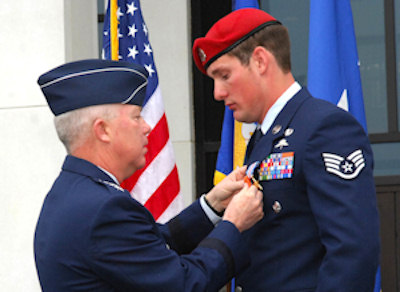 |
| Lt.
Gen. Donald Wurster, commander of Air Force Special Operations Command,
presents the Silver Star to Staff Sgt. Caleb Heidelberg, 21st Special
Tactics Squadron, during a Silver Star Ceremony April 23 at the Combat
Control School on Pope Air Force Base. General Wurster also presented
four Bronze Star Medals with Valor, four Bronze Stars, three Purple
Hearts and seven Air Force Combat Action Medals to special tactics
Airmen for actions during their deployments. |
|
During
their deployments, Airmen from the 21st STS, here, along with Airmen
from the 720th Special Tactics Group, participated in more than 1,700
combat operations leading to the capture or elimination of more than
1,900 enemy insurgents.
The
Silver Star, the nation's third highest decoration for valor, was
presented to Staff Sgt. Caleb Heidelberg for his actions during a
firefight against enemy forces in Afghanistan in summer 2008.
In
support of Operation Enduring Freedom, Sergeant Heidelberg, along with
members of the Army Special Forces and the Afghanistan National
Security Forces team, conducted a mounted combat reconnaissance patrol.
As members of the patrol dismounted to clear a vegetated area, they
were ambushed within 10 meters by enemy insurgent forces employing
heavy and effective small-arms and mortar fire, injuring all of the
dismounted team.
Sergeant
Heidelberg became cognizant of the grave danger faced by his teammates,
and exposed himself to extensive enemy fire while repositioning his
vehicle to provide cover for his wounded comrades. With continued
disregard for his own safety, he then stationed himself forward of the
vehicle and suppressed the enemy with his squad automatic weapon,
allowing his vehicle's gunner to climb to the mounted turret, clear the
jammed automatic grenade launcher and put fire on the enemy.
Sergeant
Heidelberg realized members of his patrol were wounded, still exposed
and in mortal danger. Without hesitation, he moved from the cover and
protective fire of his position and ran toward them. Exposing himself
again to heavy enemy fire, Sergeant Heidelberg carried a seriously
wounded Afghan soldier back to the protection of the vehicle.
As
the fight continued, he directed a complex air-ground battle to destroy
the enemy with AH-64 strafing attacks |